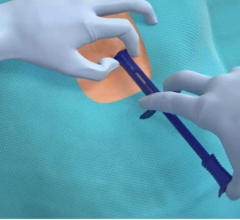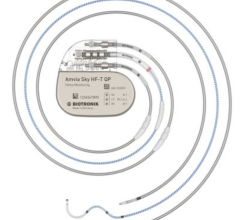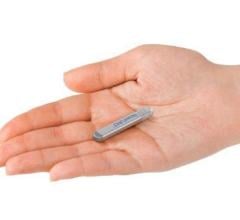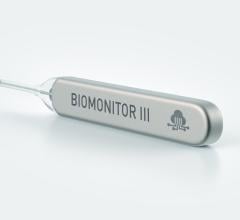
March 24, 2023 — Abbott announced new data that found monitoring patients remotely with hemodynamic pressure sensing technology, such as with its CardioMEMS HF System, can significantly1 improve survival in heart failure patients with reduced ejection fraction (HFrEF). The analysis is the first to give doctors specific insight into how remotely monitoring patients with technology like CardioMEMS can provide an early warning against worsening heart failure and significantly reduce mortality risk by 25% at two years in HFrEF patients.
The meta-analysis of three randomized, controlled trials (CHAMPION, GUIDE-HF and LAPTOP-HF) was presented at the Technology and Heart Failure Therapeutics (THT) Conference in Boston, Mass. (March 20-22, 2023). The data reinforce that – in addition to providing an early warning system against worsening heart failure – remote monitoring technology like CardioMEMS can help doctors more proactively make changes to a patient’s treatment plan before the disease advances, often resulting in repeat hospitalizations. A patient’s risk of mortality significantly rises2 with each heart failure-related hospitalization, making it critical that treatment plans aim to manage the disease and keep patients out of the hospital.
The CardioMEMS sensor is a paperclip-sized device that, once placed in the pulmonary artery during a minimally invasive procedure, monitors for pressure changes that indicate worsening heart failure. It wirelessly transmits daily readings to a patient’s clinical team – empowering the patient and their care team to manage their condition from virtually anywhere. HFrEF, the type of heart failure assessed within the latest meta-analysis, occurs when the heart muscle is weakened and not able to pump out enough blood for the body, representing roughly half3 of all cases of heart failure.
"The incidence of heart failure is a growing epidemic that affects more than 6.2 million Americans – and nearly half of those hospitalized for heart failure die within a year of their first admission," said JoAnn Lindenfeld, M.D., investigator for the meta-analysis and professor of medicine at Vanderbilt University Medical Center in Nashville, Tenn. "This analysis confirms that remote pressure monitoring is a life-extending option that reduces hospitalizations and should be considered for those with this type of weak heart."
New Clinical Data Reveal Life-Extending Benefits of Remote Pressure Monitoring
Within the new analysis, data from the CHAMPION, GUIDE-HF and LAPTOP-HF4 trials were combined to assess the mortality and heart failure hospitalizations of 1,350 HFrEF patients. Among the three randomized trials, more than 650 patients were subjected to hemodynamic monitoring and 684 received the control. Heart failure hospitalizations were analyzed over a 12-month follow-up period and all-cause mortality was evaluated across 24 months.
The meta-analysis validated that hemodynamic monitoring can slow the progression of heart failure in HFrEF patients by significantly decreasing heart failure-related hospitalizations and improving survival.
"These new findings are encouraging news for physicians and the millions of people living with a progressive disease for which there is no cure," said Philip B. Adamson, M.D., chief medical officer of Abbott's heart failure business. "Heart Failure is a growing health crisis that demands innovative solutions and now we have a clinically-proven life-extending option for this population."
The CardioMEMS HF System is approved for use in people living with New York Heart Association (NYHA) Class II or III heart failure who either have been hospitalized for heart failure in the previous year or for patients who undergo a blood test showing elevated levels of biomarkers known as natriuretic peptides, which indicate worsening heart failure. The hemodynamic data are used by physicians for heart failure management with the goal of controlling pulmonary artery pressures and reducing heart failure hospitalizations. The CardioMEMS sensor first received approval from the U.S. Food and Drug Administration (FDA) in 2014.
Indications and Important Safety Information:
For U.S. important safety information for the CardioMEMS HF System, visit: https://www.cardiovascular.abbott/us/en/patients/treatments-therapies/pulmonary-artery-pressure-monitoring-for-heart-failure/important-safety-information.html.
References:
1 “Longer Term Effects of Hemodynamic Monitoring on Outcomes: A Combined Data Analysis of HFrEF patients in CHAMPION, GUIDE-HF AND LAPTOP-HF”; Adamson, Costanzo, Desai, Ducharme, Henderson, Johnson, Lindenfeld, Maisel, Mehra, Paul, Sears and Zile; Presented at the THT Conference, Boston, Mass., March 21, 2023.
2 Setoguchi S, Stevenson LW, Schneeweiss S. Repeated hospitalizations predict mortality in the community population with heart failure. American Heart Journal. 2007;154(2):260-266. doi:10.1016/j.ahj.2007.01.041
3 Murphy SP, Ibrahim NE, Januzzi JL Jr. Heart Failure With Reduced Ejection Fraction: A Review. JAMA. 2020 Aug 4;324(5):488-504. doi: 10.1001/jama.2020.10262. Erratum in: JAMA. 2020 Nov 24;324(20):2107. PMID: 32749493.
4 Sensor studied in the LAPTOP-HF trial is not approved or available for clinical use.
Related CardioMEMS content:
Abbott’s CardioMEMS HF System Receives FDA Approval to Support Patients Battling Earlier-Stage Heart Failure
Cardiogenic Shock Market Outlook
Related Heart Failure Technologies to Reduce Hospitalizations:
VIDEO: Remote Heart Failure Monitoring Results in Reduced Readmissions — Interview with William Abraham, M.D.
New CardioMEMS Data Shows Effectiveness in Reducing Heart Failure Readmissions
VIDEO: Technologies to Reduce Heart Failure Readmissions — Interview with William Abraham, M.D.
Abbott Initiates GUIDE-HF Trial for Improved Outcomes With CardioMEMS Monitor
Device Technologies to Reduce Heart Failure Readmissions
Reducing Heart Failure Readmissions
Find more heart failure technology news


 July 02, 2025
July 02, 2025 









